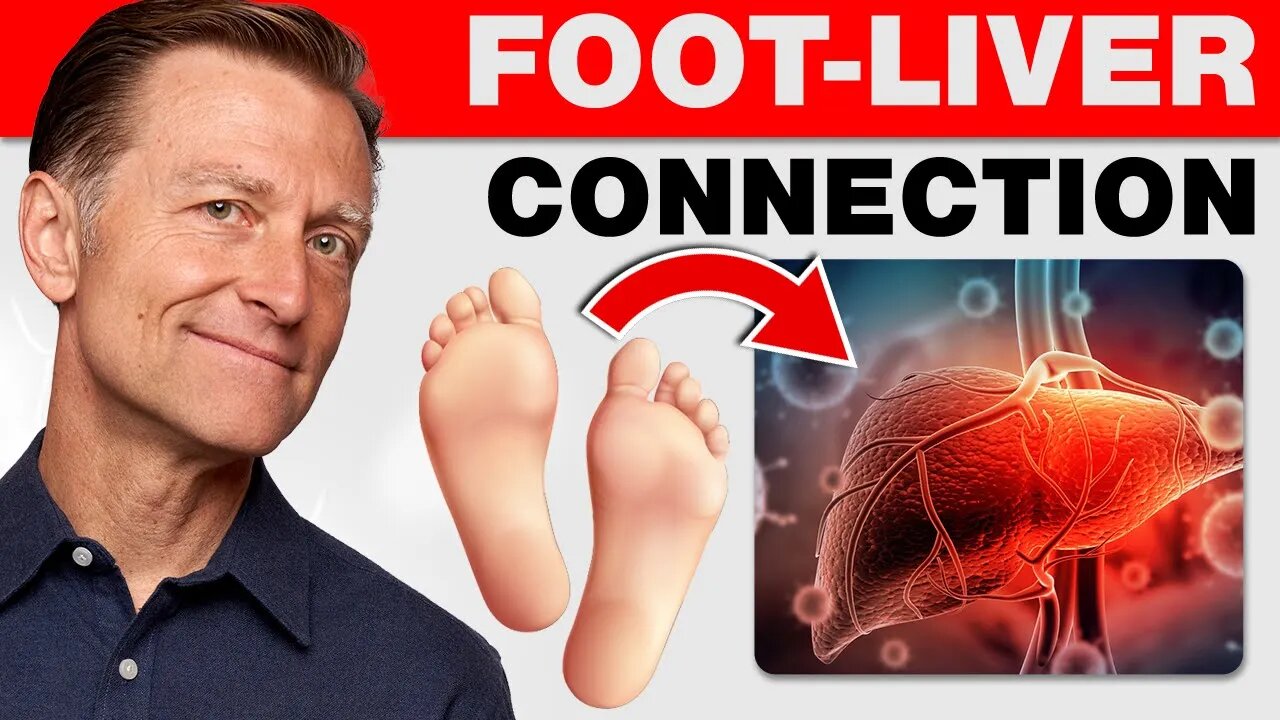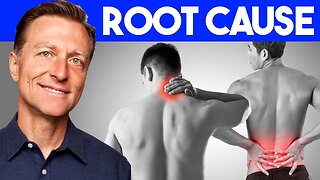Premium Only Content

How Your Feet Are Warning You About Your Liver Problems - Dr. Bergs Advice
Did you know you can spot liver problems in your feet?
Timestamps:
0:00 Liver problems can show up in your feet; here’s what to look for
2:40 Itching of the bottom of your foot indicates a backup of fluid into the liver
4:44 Here are some causes of liver problems
5:40 I recommend a good diet for your liver
Because liver problems often show up in your feet, I explain the signs and symptoms to look for. For a full diagnosis of liver disease, please see your doctor.
Red and brown dots, which can also be shiny, can appear on the lower leg. This indicates poor circulation. It could also be diabetes, but you see this a lot in people with liver problems.
You may also see spider veins (spider nevus). This can be an indication of too much estrogen in the liver. If your heels are cracked, this is usually a vitamin B3 deficiency or an omega 3 fatty acid deficiency. One function of the liver is to make bile to help your body absorb fatty acids including vitamin A and vitamin E.
Itching on the bottom of your foot indicates a backup of fluids into the liver. For example, if bile backs up and your liver is congested, you could be getting a build up of histamines.
Pain or inflammation in the bottom of the foot often mimics plantar fasciitis, but can be a liver problem. You can also have hot feet, and bad odor when your liver can’t detoxify correctly so toxins are leaking out through your skin.
Usually if someone’s liver is bad, it means their diet is bad, and their body is full of toxins. Chances are, if your liver is bad so too are your kidneys and colon.
If you have pitting edema is also a common liver symptom. You may also have toenail fungus. People with liver problems often have more fungus in and on their body, due to an imbalance of their gut microflora. You may also experience dandruff and psoriasis. Your nail beds turn white.
Common causes of liver problems include medications, sugar (especially high fructose corn syrup), cooked foods, too few vegetables, excessive alcohol, and excessive protein.
A healthy ketogenic diet combined with intermittent fasting is best for a healthy liver.
Now you know how to spot liver problems, understand their causes, and how to get your liver healthy again.
Talk to a Product Advisor to find the best product for you!
Call 1-540-299-1556 with your questions about Dr. Berg's products. Product Advisors are available Monday through Friday 8am-6pm and Saturday 9am-5pm EST.
* At this time, we no longer offer Keto Consulting and our Product Advisors will only be advising on which product is best for you and advise on how to take them.
Dr. Eric Berg DC Bio:
Dr. Berg, age 56, is a chiropractor who specializes in Healthy Ketosis & Intermittent Fasting. He is the author of the best-selling book The Healthy Keto Plan, and is the Director of Dr. Berg Nutritionals. He no longer practices, but focuses on health education through social media.
Follow Me On Social Media:
Facebook: https://bit.ly/FB-DrBerg
Instagram: https://bit.ly/IG-DrBerg
Anchor: https://bit.ly/Anchor-DrBerg
TikTok: https://bit.ly/TikTok-DrBerg
DR. BERG'S SHOP: http://shop.drberg.com/
Send a Message to his team: https://m.me/DrEricBerg
ABOUT DR. BERG: https://www.drberg.com/dr-eric-berg/bio
Disclaimer:
Dr. Eric Berg received his Doctor of Chiropractic degree from Palmer College of Chiropractic in 1988. His use of “doctor” or “Dr.” in relation to himself solely refers to that degree. Dr. Berg is a licensed chiropractor in Virginia, California, and Louisiana, but he no longer practices chiropractic in any state and does not see patients so he can focus on educating people as a full time activity, yet he maintains an active license. This video is for general informational purposes only. It should not be used to self-diagnose and it is not a substitute for a medical exam, cure, treatment, diagnosis, and prescription or recommendation. It does not create a doctor-patient relationship between Dr. Berg and you. You should not make any change in your health regimen or diet before first consulting a physician and obtaining a medical exam, diagnosis, and recommendation. Always seek the advice of a physician or other qualified health provider with any questions you may have regarding a medical condition.
-
 10:52
10:52
Dr. Eric Berg
16 days agoThe Science of Inflammation: Dr. Berg
9.94K3 -
 2:43:30
2:43:30
Donald Trump Jr.
4 hours agoFull Coverage of My Father’s Inauguration, America is Back. | TRIGGERED Ep.209
252K212 -
 LIVE
LIVE
LFA TV
22 hours agoLIVE: INAUGURATION OF PRESIDENT DONALD J. TRUMP
5,879 watching -
 1:49:47
1:49:47
Donald J. Trump
2 hours agoThe 60th Presidential Inauguration Ceremony
268K442 -
 DVR
DVR
GOP
12 hours agoThe 60th Presidential Inauguration Ceremony
97.6K36 -
 LIVE
LIVE
Redacted News
4 hours agoLIVE INAUGURATION DAY COVERAGE | Trump officially takes office
7,750 watching -
 1:04:17
1:04:17
The Dan Bongino Show
4 hours agoTrump's Historic Inauguration - LIVE FROM DC (Ep. 2404) - 01/20/2025
788K1.39K -
 1:07:17
1:07:17
Nerdrotic
3 hours ago $6.05 earnedReturn of the KING! - Nerdrotic Nooner 459
103K2 -
 2:37:40
2:37:40
Due Dissidence
12 hours agoLIVE: Donald Trump Inauguration - Reaction, Commentary, Reporting From DC
59.3K14 -
 LIVE
LIVE
Benny Johnson
4 hours agoTrump Inauguration LIVE Right Now, Officially Sworn in as President | ‘The Golden Age BEGINS!’
18,466 watching